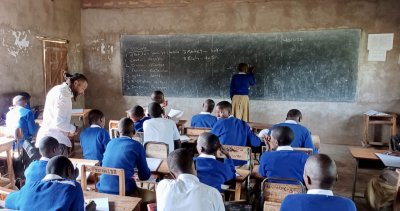SST as a discovery of heritage
This article originally appeared in the Summer 2023 issue of Global Connections, a Study-Service Term Newsletter.
By Jennifer Schrock
An increasing number of Goshen College students join an SST course or semester as a way of exploring their own heritage. While some students prefer an adventure in a culture as different as possible from their own, others welcome the chance to deepen their understanding of their own backgrounds.

Billy Gene Easton II, an African-American who returned to college in his 40s, was thrilled when he learned he could spend the spring of 2023 in Tanzania through the SST program. Easton has reflected on his African-American heritage at length and had a lifelong desire to visit Africa.
“For me as an African-American, to go back home was a profound experience–very spiritual. I saw that I was an African from a beautiful place and a beautiful culture that is the cradle of humanity. Africa is a very healing place.” Easton said. His sense of “coming home” increased when he realized that a number of his U.S. family members have names similar to Swahili words. He suspects he may have genetic roots in East Africa, since slaves were shipped from to the Americas from both East and West Africa. Easton was intrigued to interact with African people whose ancestors had not experienced the trauma of slavery.
“To see Africans owning their own land, working on their land; to see them as stewards of the land and the community was profound. In my history, we worked other people’s land,” Easton explained. He would like to have been able to visit Africa as a child in order to have been shaped by this experience earlier.
The SST unit also visited Tanzanian slave ports such as Bagamoyo. This was painful for Billy, but Tanzanian people taught him how they dealt with injustice. In one memorable conversation, he asked someone he’d met how Africans felt about an injustice.
“We choose peace, brotherhood and love and we’re okay with the consequences of that,” was the response he received. Easton had never heard someone say that before, and it struck him.
“We’ve inherited painful memories, but we all have the choice to be free. You’re free! No
one’s lived better than you have. We need to recognize that we are the result of horrible
things that occurred that people cannot get justice for. The only justice we can do for our ancestors is to value each other and to heal,” Easton said.
Puerto Rican Identities, a recent May Term course in the sequential SST thread, Hispanic Identities, filled up a year in advance largely because it appealed to Latinx students. Isis Espinoza, a fourth-year TESOL and education major who grew up among Puerto Rican friends and family members, was pleased to learn there was an SST course in Puerto Rico. Experiencing
Puerto Rican food, language and community first hand rather than through others was a powerful experience for her.
“I’ve always struggled with my sense of identity growing up in a primarily white environment. It was hard to feel proud of who I was. This trip helped me know who I am, regardless of what other people think about Puerto Rican people. I’m proud of the people who came before me.”
A highlight for Isis was spending Mother’s Day with four generations of her Puerto Rican host family and seeing their warmth and care for each other.
Students in the Navajo and Hopi Nations SST unit who had Mexican roots were surprised and honored when Navajo people greeted them as part of the Mexican Navajo clan. They were not
regarded as “Belagana,” or white people but as part of the Navajo clan in Mexico.
“It helped us have a deeper experience; they were more comfortable talking to us,” Areli Guzman, a second-year biochemistry major, said.
Currently, Easton and Arleth Martin, a junior sociology major whose SST experience was also in Arizona, are promoting the SST program with their African-American and Latinx peers.




